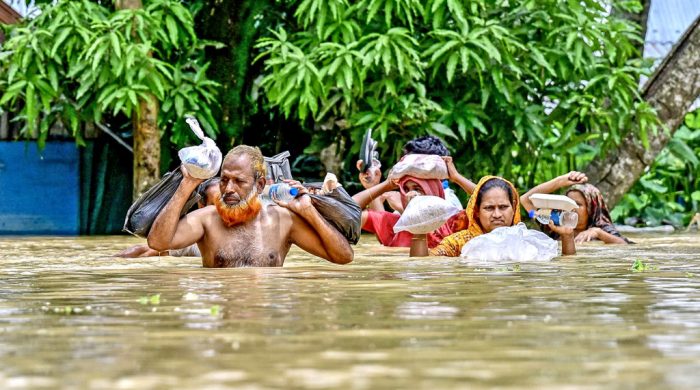Needs-based planning a must for humanitarian response

- Update Time : Saturday, August 31, 2024
- 28 Time View

AS I write this, Bangladesh is facing an unprecedented flood situation, the likes of which the country has not experienced in recent history. The sudden onset of flash floods has created a humanitarian crisis, particularly in the southeastern part of the country. The floods struck so abruptly that many people were completely unprepared as the floodwaters surged from upstream, breaching embankments, destroying roads, and inundating houses. In response, many were forced to take shelter on high ground, in buildings, on rooftops, and even in trees. The situation was so dire that it has undoubtedly had a profound impact on the mental well-being of those affected.
Simultaneously, torrential rain accompanied by strong winds has severely hampered rescue operations. Water levels continued to rise until August 23 and exacerbated the already critical situation. Many families were disconnected from their loved ones as communication was near impossible. I have heard that many people living in Dhaka and other parts of Bangladesh were unable to contact their relatives in the affected areas, leading to widespread anxiety and fear. The situation was indeed terrible, unlike anything Bangladesh has experienced in recent memory.
In response to this dire situation, the people of Bangladesh have shown remarkable solidarity. Citizens from all walks of life have stepped forward to support the victims through rescue operations and the provision of essential food supplies. Various social groups, small organisations, and individuals have come together to collect funds and assist in rescue efforts. This outpouring of support, transcending religious, racial, and political boundaries, demonstrates the deep sense of harmony and solidarity that exists among the people of Bangladesh.
While these initiatives are a testament to our commitment to the country and our compassion for our fellow citizens, it is crucial to ensure that these efforts are managed effectively. Without proper coordination and planning, well-intentioned actions could inadvertently harm those at risk and those who have generously provided funds and support.
Effective coordination is the cornerstone of any successful humanitarian response. This includes coordination among rescue teams and with organisations that are specialised in and responsible for such operations. Too often, in our eagerness to help, we may rush into rescue operations without adequate training or equipment, which can increase risks to both the rescuers and the people they are trying to save. As I write this, at least one person has died during the rescue operation. It’s essential to work in tandem with established organisations and follow their protocols to ensure that our efforts are both safe and effective.
It is imperative to ensure that our actions during the operation do not inadvertently cause harm. Sometimes, in our rush to help, we underestimate the adaptive capacity of the affected people or fail to consider the potential hazards that our actions may introduce. During the emergency response after the embankment breach at Sariakandi in Bogura, I witnessed somehow different groups of people or organisations throw food from boats to people stranded in the water. This created a chaotic situation where people scrambled to grab the food, leading to injuries and further distress. Such poorly managed aid distribution can exacerbate the situation rather than alleviate it. This is also important to consider during rescue operations as well.
Understanding and addressing the specific needs of those affected is crucial. For instance, distributing food that is not culturally appropriate or needed by the community can lead to waste and frustration. I recall an incident after Cyclone Sidr when we collected a large amount of clothing, only to discover that the affected people did not need clothing. As a result, we had to return with a truck full of unused clothes, highlighting the importance of needs-based planning. This is a classic example of how well-intentioned efforts can fall short when they are not aligned with the actual needs of the community. Humanitarian efforts must be impartial and independent, without regard to race, culture, religion, or political ideology. In the recent flood response, we witnessed a remarkable display of unity across these lines, which is a unique strength of Bangladesh. This unity should be preserved and strengthened in all humanitarian efforts, ensuring that aid reaches all those in need, regardless of their background.
Moreover, humanitarian responses should be tailored to the specific needs of the community and people in need. As the floodwaters recede, new challenges will arise, requiring ongoing support and long-term planning. It is essential to maintain close coordination with local government and other organisations to address these changing needs effectively. The Needs Assessment Working Group has already published an initial assessment of the community’s needs, and this should guide the planning and execution of long-term recovery efforts.
Psychosocial support is often overlooked in disaster response, but it should be a priority, especially given the unprecedented nature of this flood. The trauma experienced by the affected people is profound and requires comprehensive mental health and psychosocial support services. Ignoring this aspect could lead to long-term psychological issues for the affected individuals, further complicating their recovery.
Indeed, fundraising efforts should not only focus on immediate relief but also consider the long-term needs of the affected communities. Continued social action and fundraising are essential for sustained recovery and resilience-building. This approach will ensure that the resources needed for both immediate relief and long-term rehabilitation are available.
During this era of climate change and uncertainty, staying informed about weather warnings and flood forecasts is crucial for effective disaster preparedness and response. Monitoring the Flood Forecasting and Warning Centre website, for instance, can provide valuable insights into flood trends and help in planning proactive measures to mitigate the impact of future floods.
Finally, we must continue our positive efforts and remain motivated to support the flood-affected people. As part of a broader reform in Bangladesh, there is a need to engage the youth in disaster education and community involvement. By fostering a culture of preparedness and resilience, we can better equip our communities to face future challenges and build a stronger, more united Bangladesh.
Aminul Haque is humanitarian aid and development practitioner.



















